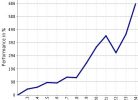By MITCH ZACKS
When 2020 started, my biggest concerns were an escalating trade war with China and geopolitical tensions with Iran. No one could have anticipated that by October, some 25 million Americans would be collecting unemployment benefits while the nation remains locked in an 8-month battle with a global pandemic.
Now, we’re one month away from what is perhaps the most emotionally-charged – and uncertain – presidential election in modern U.S. history. What does this all mean for equity markets in Q4?
For insight, I am going to start with an objective history of elections, politics, and the stock market. Anytime I venture into the political sphere, I remind readers that my approach to politics is agnostic – I do not favor one outcome over another. My concern is the economic cycle, corporate earnings, and to a lesser extent, how policy may impact the trajectory of the recovery.
Regarding history, it is common in presidential election years for investors to assume their political party is better for the stock market. Others may believe a specific balance of power within the executive and legislative branches delivers the best results. History says the stock market goes up regardless of how power is divided:
S&P 500 Average Annual Performance, 1933 – 2019

Source: Strategas Research.
To note: the above returns exclude 2001-2002, as power in the Senate changed hands three times in that period.

To note: the above returns exclude 2001-2002, as power in the Senate changed hands three times in that period.
If you’re wondering why returns are missing for a Democratic president, Democratic House, and a Republican Senate, it’s because the last time the U.S. had this balance of power was in 1886!
Some market historians may note that Democratic presidents have been better for equity market returns. Since 1933, for example, Democratic presidents have experienced higher stock market returns than Republican presidents. But if we strip-out the outsized gains during the 90’s tech boom (Clinton) and the declines of the dot-com bust and 2007-2008 Financial Crisis (Bush), then the difference in returns between Democrats and Republicans is essentially zero. In my view, market and business cycles over the long-term matter more than political parties do.
I am not going to get into the weeds on taxes or tax policy here, mainly because any tax plans made during the campaign rarely materialize as advertised. What I will note, however, is that many believe a Biden win would mean higher corporate and top-end tax rates, which is a perceived negative for earnings and equity markets. Once again turning to history, I cannot find strong evidence that marginally higher taxes adversely impact long-term equity returns.
The biggest sustained increase to corporate tax rates occurred in the 1940s and 1950s, with the tax rate topping 50%. As corporate tax rates soared during and after World War II, the stock market was hardly fazed. During the 1940s, the S&P 500’s total return was +143.10%, and during the 1950s the index jumped +467.40%.
Corporate Tax Rates from 1920 to Present

Source: Internal Revenue Service
Same goes for personal income tax rates. The Biden campaign has proposed raising individual tax rates for those earning over $400,000 to 39.6% from 37%, while also proposing a slight increase to Social Security payroll taxes on the high end of the income spectrum. Relative to history, these proposed changes are marginal – the top tax rate was above 90% for all of the 1950s, and as mentioned the S&P 500 went up 467.4% over that decade. Taxes matter, but the economy and the market can absorb higher tax rates better than most people think, in my view.
One last point to make is regarding volatility surrounding the election. The uncertain nature of the voting process and perhaps the result has many thinking the stock market will be volatile in Q4. I do not disagree. But in my view, long-term investment strategies should not attempt to factor-in the possibility of short-term volatility. I also think fear of election mayhem may already be priced into stocks, which to me means if we can avoid a worst-case scenario, stocks could deliver an upside surprise.
At the end of the day, no one knows how this election will unfold. But I do know and believe that changing your long-term strategy because of a short-term unknown is not a prudent approach – it hasn’t been throughout history, and I do not think special circumstances make it prudent today.
Bottom Line for Investors
Over time, the stock market responds more to long-term earnings and economic growth trends – not to changes in political leadership. The emotional gravity of an election – and in particular this one – may make it appear as though the outcome will make or break the nation. But I believe this mindset puts far too much emphasis on political figures and policies, and far too little emphasis on the real engines of the U.S. economy – corporate earnings, small business growth, investment, the consumer, and innovation. Politicians come and go, but the desire to grow, innovate, and pursue profit remains a constant.
Wenn du keinen Beitrag mehr verpassen willst, dann bestell doch einfach den Newsletter! So wirst du jedes Mal informiert, wenn ein neuer Beitrag erscheint!








Warum sehe ich diesen Beitrag nur in englischer Sprache?
Auf DEUTSCH täte ich mir wesentlich leichter!
Liegt wohl daran, dass der Autor Amerikaner ist, Hansjörg.
Wer nur auf deutsch liest, der kann im Finanzbereich leider vor allem ausgesprochen schlecht Quellen lesen. Ich rate ab. Ich habe anfänglich ganz viel mit einem elektronischen Wörterbuch gearbeitet um Texte auf amerikanischen Seiten zu verstehen. Auch bei Büchern ist die Lage ähnlich. Die wirklich guten Bücher gibt es nur ganz selten auf deutsch.
Danke Christian es ist in der Tat so, dass Übersetzungsprogramme diesbezüglich nur verzerrend und zum Teil wirklich unverständlich ihren Dienst tun! Bei Finanzen.net viele diesbezüglich unsäglich übersetzte Nachrichten welche ich fast schon als Kalauer abtun möchte.
Leider sind viele Anleger auch nicht in der Lage diese in englisch verfassten Informationen in gänze zu verstehen. Gerade da bauen wir auf Dich lieber Christian hierzu eine verständliche Übersetzung ins DEUTSCHE zu liefern. Auch gerade deshalb weil sich dieser Blog „Großmutters Sparstrumpf“ nennt! Für meine Großmutter war Englisch noch absolut unverständlich!
Hallo Hansjörg, versuch’s doch mal mit der Übersetzungsfunktion Deines Browsers (rechte Mausklick) oder mit einer Website wie http://deepl.com oder http://translate.google.com
Viele Grüße!
Vielen Dank für den nützlichen Ratschlag!
.-)